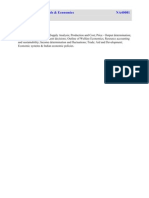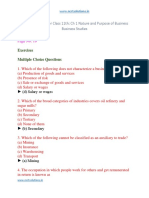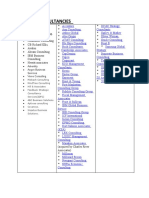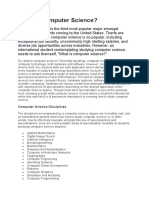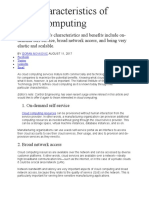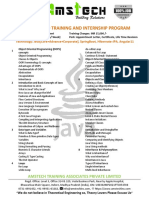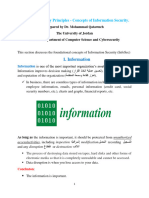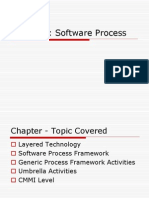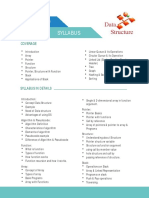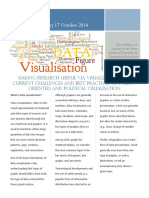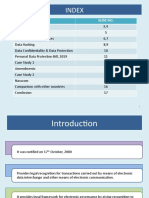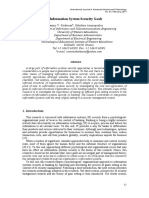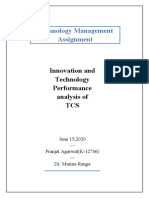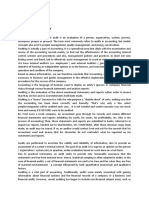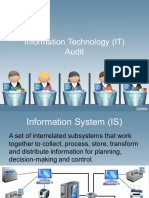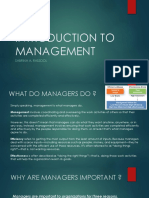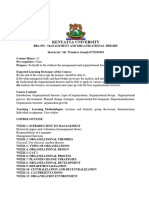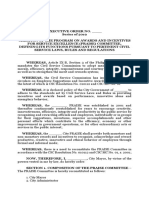CHAPTER ONE
MANAGEMENT: AN OVERVIEW
Introduction
Is management necessary? Why? What does a manager actually do? What are some of the
characteristics of the field of management? These are the questions that beginning student of
management often asks. To answer some of these concerns, just look at yourself. You are a
manager of your time, energy, and talents. The decisions you make each day in these three areas
will have a far-reaching influence on your career, your life and the lives of others. Think of
yourself getting up on the morning you must decisions at once: You must plan what you want to
accomplish during the day, organize the resources to achieve your plan and periodically check on
those activities to see if your plan is being achieved. Realizing it or not, you are performing three
of the management function planning organizing and controlling. This is simply to show you
how the task of managing is performed in our day-to-day life. Therefore, this chapter is designed
to introduce you with the meaning, features, significance, function and roles of management in
general.
1.1 Definitions of Management
It is impossible to provide a single, comprehensive, universally accepted definition of
management, the different orientations about the definition of management is because:
i. Management has various aspects, that all of which cannot be represented by a single definition
ii. The theorists who gave the definitions has different areas of interest or training, they all
defined management form their perspective (engineering, sociology, psychology etc.)
iii. Management as a discipline is young and there is a lack of clarity of concepts and principles
Despite all the above reasons for different definitions, the definitions are not contradictory or
mutually exclusive. Management is the synthesis of all the definitions given by different
theorists.
The following are some of the different definitions given by different scholars of management:
i. Management is the art of getting things done through and with people in a formally organized
group.
ii. Management is the art of knowing what you want to do in the best and cheapest way.
iii. Management is the process of planning, organizing, staffing, directing and controlling the
uses of a farms resources to effectively and economically attain its objectives.
Page | 1
�iv. Management may be defined as the art of securing maximum result with a minimum of efforts
so as to secure maximum prosperity and happiness for both the employer and employee and give
the public the best possible service.
v. Management is the process of working with and thought others to effectively achieve the
organization objectives in a changing environment.
1.2 Features of Management
Every field of study should have its own features those distinct from other. Management as a
separate field of study has also its distinctive characteristics.
Organized activity: When a group of people come together to achieve a common
objective or objectives, they need to coordinate& cooperate among each other & this is
organized activity.
Existence of objectives: Without objectives no organization is complete.
Relationship among resources: Integration of various resources; money, machinery,
materials & men. The most important resource is man, which can create this integration.
Working with and through people: Management involves working with people, and also
commanding, directing and controlling their activities.
Decision making: Decision making is one of the most important activities in management
and it involves selecting the best alternative among many.
Human activity: Managers will never be substituted by technological advancement.
However, the work of management is evolved through the contribution of different
disciplines including psychology, sociology, law, economics, mathematics, and so on.
1.3 Significance of Management
Management is one of the most important human activities. Ever since people began forming
groups to accomplish activities they could not achieve as individuals, management has been
essential to insure the coordination of individual efforts. As society has come to rely increasingly
on group efforts, and as many organized groups have become large, the task of managers has
been raising in importance.
To be more specific, the following are the reasons why we study management:
Because managers guide and direct the organizations that provide goods and services up
on which society depends. In doing so, managers serve a critical function.
Page | 2
Because many individuals who are not trained as managers often find themselves in
managerial positions. Studying management better equips individuals to handle
managerial responsibilities.
Because the approaches and skills in management are needed to manage productivity
which is key to a countrys future success.
1.4. Functions of Management
Regardless of the type of industry, the organizational level, or the organizational function
involved, at least the following functions must be performed by anyone who is a manager:
planning, staffing, directing and controlling. A brief explanation of each of these five functions
follows.
1. Planning
Planning is the primary function of management. Nothing can be performed without planning. In
the business world, the organization should achieve the objectives. In order to achieve objective,
the organization plans what is to be done, when it is to be done, how it is to be done, and by
whom it is to be done. George R.Terry pointed out planning is a constructive reviewing of future
needs so that present actions can be adjusted in view of the established goal.
2. Organizing
Organizing as a management functions is concerned with (1) assembling the resources necessary
to achieve the organizations objectives and (2) establishing the activity- authority relationship of
the organization. It is function dealing about building the framework (Skeleton) of the future
organization to achieve objective. Planning has established the goals of the company and how
they are to be achieved; now, organizing develops the structure to reach these goals. The
activities necessary to achieve the objectives are grouped in to working divisions, department, or
other identifiable units and primarily by grouping similar and related duties. The result is a
network of interdependent units. Each unit or person in the unit should have clearly defined role
responsibility, authority and list of duties. Authority and reporting relationship among different
units and positions are clearly stated.
3. Staffing
Staffing is concerned with locating prospective employees to fill the jobs created by the
organizing process. It involves the recruitment, selection, development, and retention employees
Page | 3
�with appropriate qualification for positions created. It is one of the most important duties of
managers because successes of organization depend on the quality of its employees.
4. Leading /Directing
Directing is aimed at getting the members of the organization to move in the direction that will
achieve its objectives. Leadership is the heart and soul of management. To be effective
leaders/managers need understand individual and group behavior, techniques of motivation, and
effective styles of leadership.
5. Controlling
Controlling deals with establishing standards for performance, measuring performances against
established standards, and dealing with deviations from established standards. It attempts to
prevent problems, to determine when problems do exist, and to solve the problems that occur as
quickly and effectively as possible, controlling depends on accurate, reliable and enforceable
standards and on monitoring performances by people, machines, and processes. The best controls
ensure that work is performed to standards as planned.
1.5 Management Levels
Levels are hierarchical arrangement of managerial positions in an organization. The number of
levels of management, among other things, depends on the size of the organization. In general,
there are three managerial levels:
1. Top-Level Management
Top Level management includes that of board of directors, executive committee, and chief
executive, or president, or general manger, etc of an organization.
Function of top managements includes;
Establishing broad objectives
Designing major strategies
Outlining principle policies
Providing effective organizational structure that insures integration
Proving over all leadership and direction
Making overall control of the organization
Dealing with external parties such as the government, community, business etc, by
representing the organization and
Analyzing the change in the external environmental and responding to it
Page | 4
�2. Middle-Level Management
These managers include heads of the different functional area and their assistants: divisional
heads, departmental mangers, section heads, plants mangers, branch managers etc. Managers in
this level are specialists and their activities are limited to a particular area of operation or to a
section or department. Middle level managers direct the activities of lower level managers and
sometimes extend to supervision of operating employees. They balance the demand of top
managers and the capacity of lower level managers.
3. First line mangers (Lower-Level managers)
First line managers are responsible for the work of operating employees and do not supervise
other managers. Their tasks include planning of day to day work, assignment of jobs, keeping a
watch on workers performance, sending reports and statements to middle level managers,
evaluating workers and maintaining close contract with workers.
Functional and General Managers
Managers are also classified based on the scope of the activities they manage into functional and
general managers.
Functional managers
Functional managers supervise with specialized skills in a single area of operation, such as
accounting, personnel, finance, marketing and production. All these functions are necessary for
the success of the organization.
General Managers
General Managers are responsible for the overall operation of a more complex unit, such as a
company or a division. General Managers hold functional managements accountable for their
specialized area as and usually coordinate two or more departments. In their jobs, general
managers have to deal with major uncertainties, great diversity, and a larger volume of
information.
1.6 Managerial Skills
Skill is the ability to do something expertly and well. It is meant ability related to performance
that is not necessarily in born but which can be developed /acquired. Managerial skills can be
classified in to three distinct categories; technical, interpersonal and conceptual skills. However
in practice the skills are closely related and it may be difficult to tell where one begins and the
others end.
Page | 5
�Technical Skills
Involve the ability to apply specific methods, procedures, and techniques in a specialized field. It
is easy to visualize the technical skills of design engineers, market researches, accountants,
musicians, and computer programmer. If the manager lacks these skills, he/she will not be able to
make correct decisions or answer employees questions. These skills are more important at lower
levels of management.
Human skill (interpersonal skills)
The ability to work with employee peers; to motivate subordinate, to understand other and to be
understood by others. It includes effective oral and written communication, ability to resolve
complains, development of cooperation and motivating employee. The manager should be able
to resent clearly his/her viewpoints, extracting information from the others, and arriving at
mutually acceptable agreement. This skill is equally important to managers at all levels.
Conceptual skills
It involves the ability to view the organization as a whole and recognize its relationships to the
large environment. In other words, conceptual skill involves visualizing the different parts of an
organization as one big whole and understands the whole interaction with its relevant
environment. More specifically
How the organizations various parts and functions depend on each other and thus, how
changes in one area can affect other areas?
How each part contributes to the achievement of the overall organizational goal?
The manager uses conceptual skills to diagnose and assess different types of management
problems because they depend on an understanding of the interrelationships of various factors.
Conceptual skills are among the most difficult to develop. This skill is highly important to toplevel managers.
1.7 Managerial Roles
Managers perform the basic managerial functions by playing a variety of managerial roles. A role
is an organization set of behavior or action expected from some position holder. Henry
Mintzberg studied a verity of managerial jobs and arrived at the ten most common roles of top
managers.
The ten roles are classified in to three categories: Interpersonal roles, information roles, and
decisional roles.
Page | 6
�I. Interpersonal roles:
1. Figurehead: describes the formal activities in which the manager acts as a public official for
the company. The manager represents the organization at the ceremonial and symbolic functions.
It is the most basic and the simplest of all managerial roles. The president who greats a touring
dignitary, the supervisor who attends the wedding of the clerk, the sales manager who takes an
important customer to lunch, all are performing ceremonial duties important to the organizations
image and success. While these duties may not seem important, they are expected of managers.
They symbolize managements concern for employees customers and the community.
2. Leader role: Involves responsibility for directing and co-coordinating the activities of
subordinates in order to accomplish objectives. Some aspects of the leadership role have to do
with staffing: hiring, training, promoting, and dismissing. Other aspects involve motivating
subordinates to meet the organizations needs. Still other aspects relate to creating a vision that
company employees can identify with.
3. Liaison role: The manager interacts with peers outside of the organization such as clients,
government officials, customers, and suppliers. It also refers to dealing with managers in other
departments, staff specialists, and other departments employees. In the liaison role, the manger
seeks support from people who can affect the departments and the organizations success. This
role is therefore, composed of a network of relationships.
II. Informational Roles:
1. Monitor (never center): The monitor role involves seeking out, receiving, and screening
information. Just as a radar unit scans environment, managers scan their environments for
information that may affect their organization. Since much of the information received is oral
(from gossip and hearsay), as well as formal meetings managers must evaluate and decide
whether to use this information.
2. Disseminator: The manager sends information from external sources to various parts of the
work group and information from internal sources to others both internal and external to the
organization.
3. Spokesperson (representative): In this role the manager represents the department to other
people. Managers transmit information to others, especially those outside the organization, as the
official position of decision making. The manager is person who speaks for his or her work or
organization to people outside the work unit or organization.
Page | 7
�III. Decisional Roles:
1. Entrepreneur role: This role involves designing and initiating planned change in order to
improve the organizations position. Managers play this role when they initiate new projects,
launch a survey, test a new market, or enter a new business.
2. Disturbance handler role: Managers make decisions or take corrective actions in response to
pressure that is beyond their control. Because there are disturbances, the decisions usually must
be made quickly, which means that this role takes priority over other roles. The immediate goal
is to bring about stability. When an emergency room supervisor responds quickly to a local
disaster, a plant supervisor reacts to a strike, a first line manager responds to a break down in a
key piece of equipment- each is dealing with disturbances in the environment. These responses
must be quick and must result in a return to stability
3. Resource allocator role: This role places a manager in the position of deciding who gets
which resources including money, people, time, and equipment. There are never enough
resources toward numerous possible ends. A first line manager must decide whether an overtime
schedule should be established or whether par time workers should be hired; a college dean must
decide, based on available faculty, which courses to after next semester.
4. Negotiator role: Focuses on reaching an agreement with other outside of the workgroup on
work related issues or materials, such a labor union contracts and leasing agreements concerning
machinery and vehicles. This role includes agreements with other units within the organization.
1.8 Universality of Management
Universality of management means the reality that management is needed in all types and sizes
of organizations, at all organizational levels and in all work areas throughout the world.
Universality of management refers to the transferability of its principle, techniques, functions
and skills from one time, place or job to another. All these management practices are equally
practicable and applicable everywhere in the world irrespective of the nature of the job,
differences in customs, habits and social laws. Managerial functions and techniques can be
practiced in every organized effort. Whether it is a business, shop, industry, government office,
educational, social, profitable or non-profitable organization, management principles, functions
and techniques are profitably and productively applied. A successful manager of a company or a
field can be equally successful in the other. That is why a manger of a company can be safely
transferred from one department, company or area to another. Universality never means that one
Page | 8
�particular job should be performed by every manager. But it means that all jobs have principles
in common that must be followed by every type of manager.
1.9 Management: An Art or Science
The question whether management is an art or a science has been an issue of debate of a long
period of time. Science may be defined as a systematized knowledge derived from observation,
study, and experimentation carried on in order to determine the nature and principles of the
subject under study, since management has a structured body of knowledge with its own distinct
concepts and principles that are developed with reference to the general truths underlying the
management practice, management is a science. Although we recognized management as a
science, it is not as comprehensive or as exact as the other sciences such as physical sciences.
This is because the variables with which managers deal are complex and mostly deals with the
human element. Human beings are not standardized and their behavior is unpredictable. As a
result experiments cannot be repeated under standardized conditions. They cannot be subject of
controlled laboratory experiment.
Art is the application of knowledge that constitutes the science. Chester I. Barnard pointed out
that it is the function of the science to explain the phenomena, the events, the situation of the
past, and that their aim is not to produce specific events, effects, or situations, but explanations
which we call knowledge. However, it is the function of the arts to accomplish concrete ends,
effect results, produce situations that would not come about without the deliberate effort to
secure them. Like all other practices, management is an art. It is know-how, it is the application
of knowledge, and it is doing things in the light of the realities of the situation. Therefore,
management is both a science and an art. This is not a contradiction in terms, for art and science
complement each other-go hand in hand, are not mutually exclusive.
If a manager attempts to manage without the science (structured body of management principles
and concepts) he/she must trust luck, intuition, or what he/she did in the past. Similarly, without
the art of management, if one tries to manage by memorization of principles, diagnose by the
books, he/she will neglect practical reality.
Page | 9
